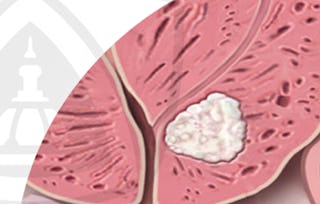Over 500,000 people in the United States and over 8 million people worldwide are dying from cancer every year. As people live longer, the incidence of cancer is rising worldwide, and the disease is expected to strike over 20 million people annually by 2030.

Understanding Cancer Metastasis
Seize the savings! Get 40% off 3 months of Coursera Plus and full access to thousands of courses.

Understanding Cancer Metastasis
This course is part of Cancer Biology Specialization



Instructors: Kenneth J. Pienta, M.D.
68,787 already enrolled
Included with
2,535 reviews
Details to know

Add to your LinkedIn profile
6 assignments
See how employees at top companies are mastering in-demand skills

Build your subject-matter expertise
- Learn new concepts from industry experts
- Gain a foundational understanding of a subject or tool
- Develop job-relevant skills with hands-on projects
- Earn a shareable career certificate

There are 6 modules in this course
Earn a career certificate
Add this credential to your LinkedIn profile, resume, or CV. Share it on social media and in your performance review.
Instructors



Offered by
Explore more from Basic Science
 Status: Free Trial
Status: Free TrialJohns Hopkins University
 Status: Free Trial
Status: Free TrialJohns Hopkins University
 Status: Free Trial
Status: Free TrialJohns Hopkins University
 Status: Preview
Status: PreviewYale University
Why people choose Coursera for their career

Felipe M.

Jennifer J.

Larry W.

Chaitanya A.
Learner reviews
- 5 stars
86.98%
- 4 stars
11.67%
- 3 stars
0.94%
- 2 stars
0.19%
- 1 star
0.19%
Showing 3 of 2535
Reviewed on Jun 3, 2018
It is a beautifully designed course. it never gets boring. The best part is that you can learn at your own pace. Thank you all the instructors and Coursera for making the content available.
Reviewed on May 9, 2021
It's a very thorough course. It not only is informative but is very insightful. I shall recommend this course to every individual who is curious to know more about cancer.
Reviewed on Jan 27, 2024
After finishing this course on cancer metastasis, i feel like i will be better at understanding the complex concepts oncology and it is like unlocking a new ability..!

Open new doors with Coursera Plus
Unlimited access to 10,000+ world-class courses, hands-on projects, and job-ready certificate programs - all included in your subscription
Advance your career with an online degree
Earn a degree from world-class universities - 100% online
Join over 3,400 global companies that choose Coursera for Business
Upskill your employees to excel in the digital economy



